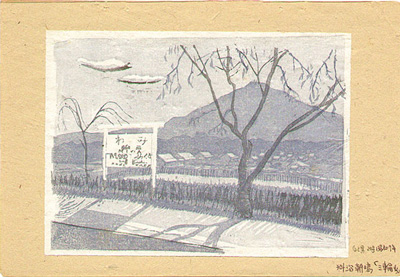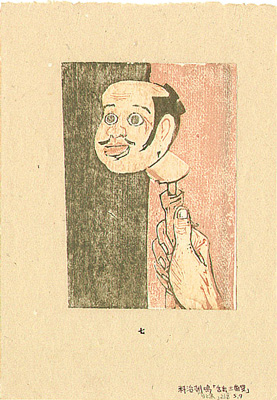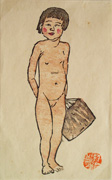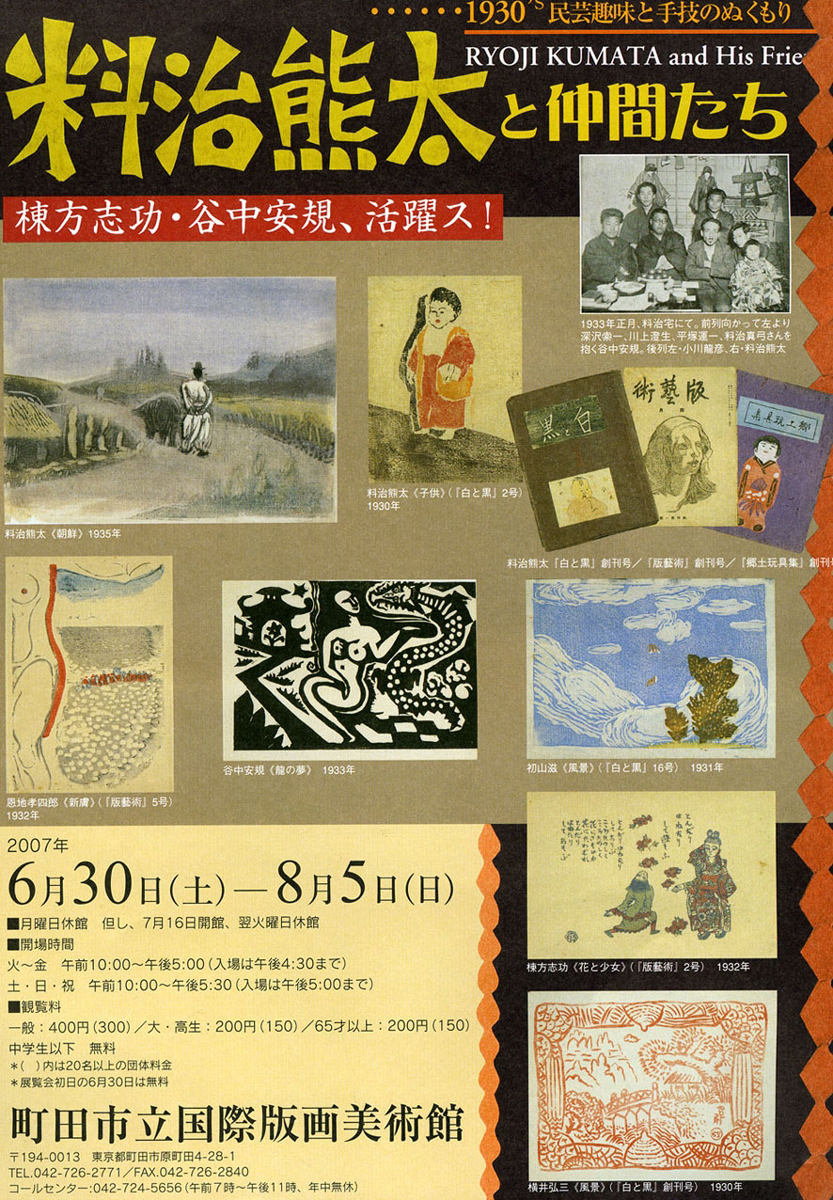Biographical Data
Biography
Ryōji Chōmei 料治 潮鳴 [Ryōji Kumata 料治 熊太] (1899-1982)
Source: Guide to Modern Japanese Woodblock Prints: 1900-1975, Helen Merritt, University of Hawaii Press, 1992, p. 128.

Better known as a print publisher than an artist, Ryōji was born in Okayama prefecture with the given name Kumata 熊太 which he used in association with his publishing activities. In the 1930s he published the small art magazines Shiro to kuro (White and Black), Han geijutsu (Print Art), along with others, including three devoted to folk toys. His own work often appeared in these magazines. He also created illustrations for various publishers after 1934 and exhibited with Nihon Hanga Kyokai.
Source: Modern Japanese Prints: An Art Reborn, Oliver Statler, Charles E. Tuttle Company, 1956, p. 99.
Ryōji encouraged unknown artists and artists from rural areas to make sōsaku hanga (creative prints.) In discussing how he came to make prints the artist Hatsuyama Shigeru (1897-1973) comments: “A publisher who lived in our neighborhood, Ryōji Kumata, was enthusiastic about creative hanga and as a hobby put out a magazine of creative prints called Han Geijutsui (Print Art), often doing the printing himself from artists’ blocks. At his urging I made my first prints. The magazine was never a commercial success, but it did a great deal to encourage modern prints.”
Source: Modern JapaneseWoodblock Prints - The Early Years, Helen Merritt, University of Hawaii Press, 1998, p. 261.
“Ryōji Chōmei wrote in Han geijutsu that his making of hanga was nothing but a hobby; he carved because he liked to. He published his hanga, he said, because he had a magazine, but without the magazine he probably would not publish them. To some extent hanga making was indeed a hobby for Chōmei. But in a setting dominated by an art establishment that scorned hanga, it is not surprising that he assumed the humility of a mere hobbyist as a protective coat. A hobbyist had nothing to lose. He was free to play with the medium.”
Source: catalog from the Christie’s sale of THE HELEN AND FELIX JUDA COLLECTION OF JAPANESE PRINTS 22 April 1998 New York, Park Avenue
Ryōji Kumata (Ryōji Chōmei) was the editor and publisher of Han geijutsu. He lived near a paper-recycling factory and was able to provide the inexpensive stock on which he printed his magazine for four years. To reach an audience much larger than that of most sōsaku hanga publications, the majority of prints published in Han geijutsu were not printed by the artists themselves, but were printed on commercial presses from the original woodblocks.
Many issues were devoted to special subjects or to the work of individual artists. Several issues are composed entirely of New Year's cards (the December 1, 1932 issue has 100 designs by various artists) and book plates, small works that gave professional artists an income and amateur artists an opportunity to create works on a manageable scale. As government censorship of artistic subject matter grew during the 1930s, sōsaku hanga artists dedicated issues to folk toys and ema (paintings on wood, often of horses or birds, given as gifts at Shinto shrines) and thus promoted the values of traditional community life. Issues devoted solely to the works of individual artists are by Hiratsuka Un'ichi (1897-1997), Munakata Shiko, Onchi Kōshirō (1891-1955), Kawanishi Hide (1894-1965), Kobayashi Asaji, Ryōji Chōmei (Ryōji Kumata) and others. In addition to prints, Ryōji solicited articles and critiques on literature and art, as well as verse and fable, to reflect his view of art as a nurturing, inclusive discipline.
2007 "Ryōji Kumata and Friends - Shiko Munakata & Yasunori Taninaka"
Exhibition at Machida City Museum of Graphic Arts
Featuring the work of Ryōji Kumata, as well as that of Shiko Munakata and Yasunori Taninaka, whose prints featured in a magazine published by Kumata, this exhibition showcases three of pre-war Japan's leading printmakers.
Ryōji Kumata (1899-1982, from Okayama), was the editor behind "White and Black", published in Tokyo in 1930, as well as a variety of other magazines about printing. He also produced his own, finely textured woodblock prints. A cultural salon, composed of Shiko Munakata and Yasunori Taninaka, formed around him.
Examples of Ryōji's Prints
Biography
Ryōji Chōmei 料治 潮鳴 [Ryōji Kumata 料治 熊太] (1899-1982)
Source: Guide to Modern Japanese Woodblock Prints: 1900-1975, Helen Merritt, University of Hawaii Press, 1992, p. 128.

Better known as a print publisher than an artist, Ryōji was born in Okayama prefecture with the given name Kumata 熊太 which he used in association with his publishing activities. In the 1930s he published the small art magazines Shiro to kuro (White and Black), Han geijutsu (Print Art), along with others, including three devoted to folk toys. His own work often appeared in these magazines. He also created illustrations for various publishers after 1934 and exhibited with Nihon Hanga Kyokai.
Source: Modern Japanese Prints: An Art Reborn, Oliver Statler, Charles E. Tuttle Company, 1956, p. 99.
Ryōji encouraged unknown artists and artists from rural areas to make sōsaku hanga (creative prints.) In discussing how he came to make prints the artist Hatsuyama Shigeru (1897-1973) comments: “A publisher who lived in our neighborhood, Ryōji Kumata, was enthusiastic about creative hanga and as a hobby put out a magazine of creative prints called Han Geijutsui (Print Art), often doing the printing himself from artists’ blocks. At his urging I made my first prints. The magazine was never a commercial success, but it did a great deal to encourage modern prints.”
Source: Modern JapaneseWoodblock Prints - The Early Years, Helen Merritt, University of Hawaii Press, 1998, p. 261.
“Ryōji Chōmei wrote in Han geijutsu that his making of hanga was nothing but a hobby; he carved because he liked to. He published his hanga, he said, because he had a magazine, but without the magazine he probably would not publish them. To some extent hanga making was indeed a hobby for Chōmei. But in a setting dominated by an art establishment that scorned hanga, it is not surprising that he assumed the humility of a mere hobbyist as a protective coat. A hobbyist had nothing to lose. He was free to play with the medium.”
Source: catalog from the Christie’s sale of THE HELEN AND FELIX JUDA COLLECTION OF JAPANESE PRINTS 22 April 1998 New York, Park Avenue
Ryōji Kumata (Ryōji Chōmei) was the editor and publisher of Han geijutsu. He lived near a paper-recycling factory and was able to provide the inexpensive stock on which he printed his magazine for four years. To reach an audience much larger than that of most sōsaku hanga publications, the majority of prints published in Han geijutsu were not printed by the artists themselves, but were printed on commercial presses from the original woodblocks.
Many issues were devoted to special subjects or to the work of individual artists. Several issues are composed entirely of New Year's cards (the December 1, 1932 issue has 100 designs by various artists) and book plates, small works that gave professional artists an income and amateur artists an opportunity to create works on a manageable scale. As government censorship of artistic subject matter grew during the 1930s, sōsaku hanga artists dedicated issues to folk toys and ema (paintings on wood, often of horses or birds, given as gifts at Shinto shrines) and thus promoted the values of traditional community life. Issues devoted solely to the works of individual artists are by Hiratsuka Un'ichi (1897-1997), Munakata Shiko, Onchi Kōshirō (1891-1955), Kawanishi Hide (1894-1965), Kobayashi Asaji, Ryōji Chōmei (Ryōji Kumata) and others. In addition to prints, Ryōji solicited articles and critiques on literature and art, as well as verse and fable, to reflect his view of art as a nurturing, inclusive discipline.
Recent Exhibition
Source: website of Tokyo Artbeat http://www.tokyoartbeat.com/event/2007/DB6F2007 "Ryōji Kumata and Friends - Shiko Munakata & Yasunori Taninaka"
Exhibition at Machida City Museum of Graphic Arts
Featuring the work of Ryōji Kumata, as well as that of Shiko Munakata and Yasunori Taninaka, whose prints featured in a magazine published by Kumata, this exhibition showcases three of pre-war Japan's leading printmakers.
Ryōji Kumata (1899-1982, from Okayama), was the editor behind "White and Black", published in Tokyo in 1930, as well as a variety of other magazines about printing. He also produced his own, finely textured woodblock prints. A cultural salon, composed of Shiko Munakata and Yasunori Taninaka, formed around him.
Examples of Ryōji's Prints
 The railroad station Miwa and Mt Miwa from the print magazine Shiro to Kuro, c. 1930s |  Shitadashi Sanbaso from the print magazine Shiro to Kuro, c. 1930s |

